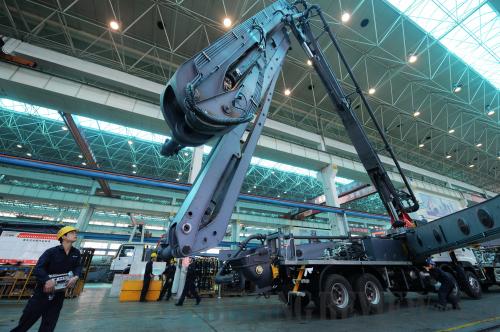|
 |
|
DAILY PRODUCTION: Sany workers debug a giant machine in a Hunan-based plant in central China (LONG HONGTAO) |
Just as Sany Heavy Industry, the largest machinery manufacturer in China, is strained by its lawsuit against U.S. President Barack Obama and the Committee on Foreign Investment in the United States (CFIUS), things seem to be getting worse.
During the Fifth Round of the China- U.S. Strategic and Economic Dialogue, held from July 10-11 in Washington, the United States International Trade Commission (ITC) announced a Section 337 investigation into Sany and its American branch for patent infringement.
The investigation was based on a complaint filed by Manitowoc Cranes that certain crawler cranes and components manufactured by Sany and its U.S. branch had infringed on two U.S. patents.
Aside from that, Sany was also accused of misappropriating trade secrets. John Lanning, who once served as an engineer in Manitowoc Cranes and switched to Sany's American branch, was suspected of leaking trade secrets to his new employer.
Xiong Qi, Sany media spokesperson, said that Sany America's SCC8500 crawler crane was completely designed by its own research and development staff, and the accusation by Manitowoc Cranes was totally groundless. Zhu Wenkui, Vice President of Sany, believed that it was Sany's ambitious overseas expansion that ignited the United States to take protectionist measures.
In recent years, Sany has quickened its plans to go global. According to its financial statements, the machinery giant harvested a revenue of roughly 10 billion yuan ($1.63 billion) from its overseas business in 2012 and the figure is expected to exceed 15 billion yuan ($2.45 billion) in 2013. In the same time, Sany has ranked top three in terms of crawler crane sales in the U.S. market, accounting for a share of 11.2 percent.
Its strong performance is a challenge to overseas rivals like Manitowoc Cranes, the former frontrunner in the trade. From 2005 to 2012, Manitowoc Cranes saw its market share shrink from 36.2 percent to 15.7 percent.
"The Section 337 investigation has been repeatedly employed as a shield of protectionism by the United States," said Zhang Guoqing, an expert from the institute of American Studies, Chinese Academy of Social Sciences.
It was derived from Section 337 of the Tariff Act of 1930, which was designed to shield the domestic economy from international competition during the Great Depression in 1929.
"A trade war is a lose-lose game. But when trade friction is inevitable, China will stand firm and fight it," said Zhou Dalin, Deputy Director General of the Bureau of Fair Trade for Imports and Exports under the Ministry of Commerce.
Investment frustrated
Sany's confrontation with the U.S. Government can be traced back to March 2012, when Ralls Corp., a U.S.-incorporated company controlled by executives from Sany Group, purchased four wind power plants in Oregon and hoped to explore the American market by fitting wind turbines produced by Sany. Originally, Sany planned to invest 3 billion yuan ($490.2 million) to build a 300,000-kilowatt wind power project. However, in July 2012, CFIUS called a halt to the construction of the four wind farms, explaining that they were near a naval test facility in Oregon. To fight CFIUS's decision, Ralls filed a lawsuit, and added Obama to the list of defendants after an executive order he issued nullified Ralls' wind farm deal over concerns of national security.
Ralls argued that the U.S. president had exceeded his statutory authority by ordering Ralls to divest its investment in Oregon. Xia Tingkang, one of the six lawyers pleading for Sany, argued that it was unfair to impose restrictions on the use and sale of Sany-manufactured wind turbines in the U.S. market, although he confirmed the president's right to restrict or call off the investment project. Wu Jialiang, Vice General Manager of Sany, calculated that the failed wind farm project cost Sany Group $20 million.
| 